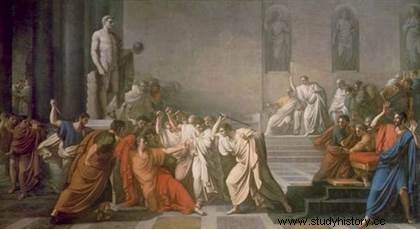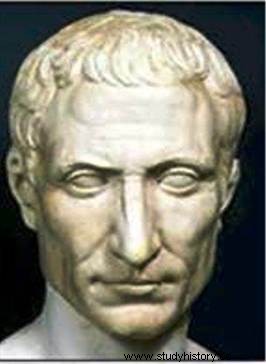 Julius Caesar (c. 100-44 BC) was an ancient Roman general and statesman. Become consul in -59, he engages in the Gallic war and defeats Vercingetorix during the siege of Alesia in 52 BC. Four years later, Julius Caesar crossed the Rubicon and marched on Rome with his army. After defeating his rival Pompey, he was named dictator. Concentrating most of the civil magistracies and now alone in command of Rome, he undertook profound reforms which ensured him increasingly important powers and announced the establishment of the Empire. He died assassinated by a group of senators on March 15 -44 during the Ides of March . He left the famous comments on the Gallic Wars, which constitute a invaluable historiographical source.
Julius Caesar (c. 100-44 BC) was an ancient Roman general and statesman. Become consul in -59, he engages in the Gallic war and defeats Vercingetorix during the siege of Alesia in 52 BC. Four years later, Julius Caesar crossed the Rubicon and marched on Rome with his army. After defeating his rival Pompey, he was named dictator. Concentrating most of the civil magistracies and now alone in command of Rome, he undertook profound reforms which ensured him increasingly important powers and announced the establishment of the Empire. He died assassinated by a group of senators on March 15 -44 during the Ides of March . He left the famous comments on the Gallic Wars, which constitute a invaluable historiographical source.
Origin and rise of Julius Caesar
Born in Rome, Julius Caesar (in Latin Caius Julius Caesar) came from a prestigious family of Roman aristocrats, the Julii. Close to Marius during the first civil war, he had to go into exile in Asia during the dictatorship of Sylla (82-79 BC). Back in Rome in 73 BC, he began his cursus honorum:he was appointed quaestor in 68 BC. J.-C., then aedile in 65, praetor in 62, his first magistracy with imperium (power to command soldiers) before being sent as propraetor in Lusitania (he left the office of praetor and then had a government provincial with imperium) in 61 BC. J.-C. where it is already signaled by a hectic activity.
But this fine progression cannot hide the fact that Caesar's political orientation, in accordance with the ideas of the populares symbolized by the great Marius, also greatly served him after the final triumph of Sylla over the partisans of Marius. Indeed Caesar had for uncle by marriage the famous rival general of Sylla and had taken for wife the daughter of Cinna, one of the lieutenants of Marius. This compromise at a time when the ideals of the optimates were essential earned him a sharp halt in his progress until the death of Sylla in 78 BC. In any case, it is certain that the young Caesar kept in mind the massacres due to the proscriptions of Sylla and that this will undoubtedly determine part of his magnanimous behavior during his conquests.
The first Triumvirate
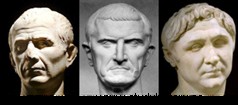 In 60 BC. J. - C., the three personalities of the Roman Republic with which it is necessary from now on to count, Pompée, Crassus and of course César, agree in a secret alliance named first triumvirate, or government with three. Each character then constituted a considerable group of clients; indeed the cogs of Roman politics are above all determined by powerful alliances united by donations around a powerful patron who in return protects them.
In 60 BC. J. - C., the three personalities of the Roman Republic with which it is necessary from now on to count, Pompée, Crassus and of course César, agree in a secret alliance named first triumvirate, or government with three. Each character then constituted a considerable group of clients; indeed the cogs of Roman politics are above all determined by powerful alliances united by donations around a powerful patron who in return protects them.
Pompey built up a considerable number of them in the East and in Spain, Crassus, because of his wealth, is very well endowed, and Caesar himself had to go into debt to expand hers. This is the reason why he asks for and obtains, thanks to his allies, the government of Cisalpine Gaul which then extends over the entire Mediterranean coast of France to the Balkan foothills, and this after having obtained the consulate in 59 BC J.-C. which had enabled him to satisfy his allies of circumstance.
The Gallic Wars
At this time, Caesar needs a great conquest which would bring him both wealth allowing him to repay his loans but also prestige to compete with Pompey on this ground with of the Roman people. He thinks for a while to bring his effort to the side of the Balkans where the Dacian kingdom becomes threatening. But it was ultimately the Germanic pressure on the Helvetii in the north of his province that led him to intervene in Gaul under the pretext of protecting the Roman world against the movements of the Celts, but also the Celts of the Germans.
The Hard War of 58 BC. J. - C. until 51 av. J.-C. with multiple twists. Gaul thus seemed pacified several times before revolts broke out, such as the most famous one led by Vercingetorix. After a sudden setback at Gergovie, Caesar imposed himself during the siege of Alesia and obtained the surrender of the Gallic chief. During this campaign, Caesar took the opportunity to launch short-lived expeditions to dark Germania but also to Great Britain, going further than any general of the time and loading his story with real propaganda with the almost journal of a kind of military expedition journal.
Caesar crosses the Rubicon
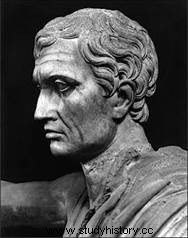 If among the people Caesar appears as a glorious conqueror, among his rivals things are not going well. same. In 53 BC. J.-C., Crassus also embarked on a large-scale expedition from his command in Syria. He is defeated and killed at Carrhae by the Parthians; the triumvirate is no more and he leaves Pompey alone to face Caesar. But in the Senate, if Pompey still weakly supports his ally, the pressure of the aristocrats ends up declaring Caesar outlaw, dismisses him from his military command and the sum to return to Rome to answer for his illegal war. Nevertheless, this sudden stiffening of the position of the Senate is not without consequences for a general at the head of a faithful and experienced army.
If among the people Caesar appears as a glorious conqueror, among his rivals things are not going well. same. In 53 BC. J.-C., Crassus also embarked on a large-scale expedition from his command in Syria. He is defeated and killed at Carrhae by the Parthians; the triumvirate is no more and he leaves Pompey alone to face Caesar. But in the Senate, if Pompey still weakly supports his ally, the pressure of the aristocrats ends up declaring Caesar outlaw, dismisses him from his military command and the sum to return to Rome to answer for his illegal war. Nevertheless, this sudden stiffening of the position of the Senate is not without consequences for a general at the head of a faithful and experienced army.
Decided to march on Rome to defend his position there, Caesar crossed the Rubicon. The Rubicon is a river serving as a border between Italian territory and Cisalpine Gaul. It has a symbolic role in Roman law:no general can cross it with his army, except with the authorization of the Senate. Rome thus protects itself from any internal threat. In passing it, Caesar defies Roman law with a certain linguistic panache:his famous “alea jacta est” (the die is cast) encourages his soldiers to see, in their illegal act, a coup legitimized by the gods. The expression "crossing the Rubicon" still means today "exceeding an unacceptable limit", "making an irrevocable bet".
Civil War:Caesar vs. Pompey
Caesar's move ends up pushing Pompey into alliance with the Senate. They then leave Italy hastily to take refuge in Greece and therefore in the East where Pompey knows that he can count on his client relationships to build an army capable of competing with that of Caesar, who in turn installs a Senate in Rome. at his orders from which he obtains in turn the consulate and the dictatorship (extraordinary magistrate, limited in time and used only when the State is in danger).
Caesar arrives in Spain where he quickly breaks Pompey's support and then goes to Illyria (in the Balkans) where he takes the offensive directly against the Republicans. After a tough fight, he finally managed to face his adversary and former ally in this duel to the death between the two greatest generals of the time. In the plain of Pharsalia, in Macedonia, He did not seem in a position of strength in the face of a clear numerical superiority in favor of his adversary. But he could rely on troops of veterans of the Gaulish campaigns, when Pompey could mainly field only young recruits.
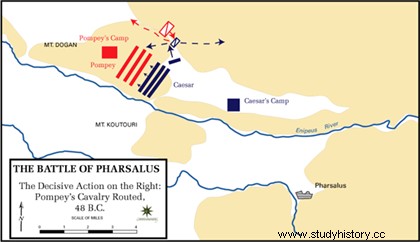 The clash is very harsh, but the fate of the battle was decided by Caesar's stratagem; he knew his cavalry was far inferior and he therefore decided to place in support of his own eight cohorts (detachments of a legion) which crushed the Pompeian charge, continued their effort and enveloped the left flank of Pompey's army. This was the beginning of the massacre.
The clash is very harsh, but the fate of the battle was decided by Caesar's stratagem; he knew his cavalry was far inferior and he therefore decided to place in support of his own eight cohorts (detachments of a legion) which crushed the Pompeian charge, continued their effort and enveloped the left flank of Pompey's army. This was the beginning of the massacre.
Pompey, defeated, left the battlefield in haste and reached Egypt where he was assassinated by order of Ptolemy XIII. Cato of Utica, one of Caesar's fiercest opponent, went to Africa to continue the war there. Caesar pursued Pompey to Egypt to find him already dead. He then had his famous adventure with the beautiful Cleopatra who even bore him a son; Caesarion. Nevertheless he experienced some setbacks in the city of Alexandria where he was blocked for a time by a revolt.
Finally victorious, he was able to leave for the North, in Asia Minor where the son of the famous enemy of Rome Mithridates VI named Pharsaces II, had just crushed the Roman governor of the region in a dazzling offensive. Caesar once came into contact with the enemy quickly defeated him and would have pronounced the famous maxim; Come vidi vici (I came, I saw, I conquered). He returned to Rome to move quickly to Africa against Cato and the other Pompeians ready to fight.
The decision was once again won by Caesar in 46 BC. AD at the Battle of Thapsus. Following this victory he left to submit the last centers of resistance in Spain, which was acquired after his victory at Munda in 45 BC. J.-C. and this in spite of painful combats. Returning to Rome, he triumphed over his Pompeian enemies as he had done in 46 at the expense of Gaul, Pontus, Egypt and Numidia, which drew mortal hatred to him.
Julius Caesar dictator
Returning to Rome at the end of August 45, Caesar celebrated the reunion with popular jubilation with no less than five official triumphs. Caesar had been seen parading in triumph over the Gauls, dragging Vercingetorix in chains. He had been acclaimed as the conqueror of Pontus, of Africa, and of Spain. To the ten provinces of Sulla's time, eight others had been added. In the popular consciousness, Caesar was gradually taking on the figure of a superman, truly beloved by the almighty gods. For propaganda purposes, he had been happy to invite Cleopatra and little Caesarion to Rome. It was very prestigious and politically convenient:he had taken care to leave in Egypt four legions and a knight responsible, of course, for commanding them, but in fact, for secretly governing this "independent" kingdom which was slowly turning to the Roman province.
 Caesar now ruled over an empire, backed by a huge army. Its size, quality, service record and even its appearance gave food for thought:thirty-nine legions, or 200,000 men, not even counting the auxiliary troops, literally in the hands of their leader, who knew how to reward the services . And then, Caesar brought back from all over the East and the West a mass of truly fabulous wealth. Nothing better to dazzle the good people than the timely display of these marvels during triumphal parades. However, who has the money - and knows how to distribute what is appropriate - at the same time has popular favor, acquired with distributions of money, basic necessities and circus shows.
Caesar now ruled over an empire, backed by a huge army. Its size, quality, service record and even its appearance gave food for thought:thirty-nine legions, or 200,000 men, not even counting the auxiliary troops, literally in the hands of their leader, who knew how to reward the services . And then, Caesar brought back from all over the East and the West a mass of truly fabulous wealth. Nothing better to dazzle the good people than the timely display of these marvels during triumphal parades. However, who has the money - and knows how to distribute what is appropriate - at the same time has popular favor, acquired with distributions of money, basic necessities and circus shows.
The support of the people, therefore, was self-evident and complemented the wealth and strength of arms. The successive votes which infinitely multiply Caesar's powers show this enough. Consul, he cumulates with this high office the dictatorship:everything was conferred on him for a period of ten years, before granting him the perpetual dictatorship. These successive votes gave Caesar, in addition to military strength and wealth, the guarantee of legality. Indeed, in the absence, in the Roman “constitution”, of any other principle than the consent of the people, its powers, however irregular they were, could not be considered illegal.
Finally, to crown it all with a religious aura, Julius Caesar had been grand pontiff since 63, augury - and on a personal level, he made no secret of descending from the goddess Venus by the supposed founder of her family. To this already unusual picture was added a breathtaking cult of personality. Three times imperator for his victories, he had been granted permission to wear triumphal attire every day, and his baldness was permanently adorned with the laurel wreath reserved for the liturgy of triumph. He has his statue in the Capitol, his effigies multiply in all the squares of the city. Solemnities commemorate the great dates of his biography, and the month of his birth is now called Julius, which will give our July.
Master of Rome's destiny, Caesar reorganized Roman possessions from top to bottom. He works to develop the regions hitherto neglected by founding colonies populated by veterans to whom he grants land. faced with the immensity of the territory controlled by Rome, he decided to favor municipal autonomy. He increased the number of city councilors and praetors and did the same with the senatorial assembly, which thus increased from 600 to 900 members, which allowed him to drown the opposition, already decimated, among people chosen from among the provincials, soldiers , or even freedmen. He also gave citizenship to the inhabitants of the Transalpine and tried to normalize the collection of taxes to counter abuses.
Assassination and posterity of Caesar
A whole set of measures that he could not carry out since the day of the Ides of March 44 BC. J.-C. unite and pacify the Roman world around him. The conspirators thought they had put an end to the disturbances of the republican regime by removing the dictator for life who had, despite his desire to be a lenient winner, crystallized many hatreds, in particular on his ambiguity vis-à-vis royalty, a regime that the Romans truly abhorred.
Caesar left a deep mark on the Roman world and Octavian (his nephew and adopted son) and Marc Antony (his master of the cavalry) continued his work before entering tear in their turn. Rome would never be the same after Caesar; what the Syllanian Restoration had accomplished precariously shattered before the ambition and skill of Julius Caesar. The Roman Republic was living its last moments and the genesis of a new State was in preparation.
It's still Caesar who will speak best for himself. Because writing was not the least of his talents:the Gallic War and the Civil War will become monuments of Latin literature. Speaking of himself in the third person, Julius Caesar makes himself the historian of his own campaigns. Sign of the impact of his work and his legend on the history of Rome; his name, Caesar, will become the first of the official titles of Roman emperors. He also gave the words tsar and kaiser, which designated Russian rulers and German emperors.
Bibliography
- Julius Caesar, Historical Biography, by Robert Etienne. Fayard, 2008.
- Julius Caesar:The Democratic Dictator, by Luciano Canfora. Flammarion, 2020.
- The True Story of Julius Caesar by Jean Malye. Beautiful Letters, 2007.
- The Gallic Wars by Julius Caesar. Flammarion, 1993.

